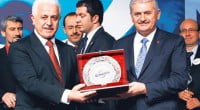Why is Fethullah Gülen so influential?

Date posted: May 5, 2013
Şahin Alpay
In 2008, the American Foreign Policy magazine and the British Prospect magazine asked their readers to vote for the world’s top public intellectual. Islamic scholar Fethullah Gülen won in a landslide. Time magazine, in its April 29-May 6, 2013 issue, published the names of the 100 most influential people in the world according to its own assessment. Gülen was one of them.
The brief article introducing him was written by Stephen Kinzer, The New York Times bureau chief in İstanbul from 1996 to 2000 and author of “The Crescent and Star: Turkey Between Two Worlds” (2001).
Kinzer said, in brief, the following about Gülen: “From a secluded retreat in Pennsylvania, he preaches a message of tolerance that has won him admirers around the world. Schools founded by his followers thrive in an estimated 140 countries. … His influence in his native Turkey is immense, exercised by graduates of his schools who have reached key posts in the government, judiciary and police. This makes him seem like a shadowy puppeteer and he is scorned by almost as many Turks as love him. But as the most potent advocate of moderation in the Muslim world, Gülen is waging an urgently important campaign.”
I pondered after reading my friend Kinzer’s lines. What was it that really made Gülen one of the most influential thinkers in the world? And why is he scorned by almost as many as respect him in his own country? My responses to these questions are clear. In Turkey and all over the world there are millions of Muslims who have no respect either for fundamentalist, fanatical interpretations of Islam or for those who try to turn Islam into a totalitarian political ideology. These millions, while being committed to Islam’s spiritual and social values, want to live in a world where freedom of expression, belief and enterprise have taken root, where ethnic and religious identities are respected, where education replaces ignorance, where science is valued as much as religious beliefs and where productive activity is encouraged and appreciated. This, undoubtedly, is the primary factor which makes Gülen one of the most influential thinkers of the world with messages he gives “from a secluded retreat in Pennsylvania.”
Another reason, surely, is the fact that he is a thinker well versed in Turkey’s rich tradition of Sufism, the people’s Islam. If Said Nursi is the religious scholar who has carried this tradition to the modern age, Gülen is the one who has helped reconcile it with the requirements of an increasingly liberalizing and globalizing world. Nursi was the leader of a religious community; Gülen is the source of inspiration for a faith-based social movement called “Hizmet” by its members.
The schools sponsored by the Hizmet movement, which literally means “movement in the service of the people,” have won the respect of thousands of parents in over 140 countries for the high quality of education they provide in English and local languages, and for establishing “peace bridges” between these host countries and Turkey. Businesses initiated by the movement at home and abroad make a substantial contribution to Turkey’s economic growth. Hizmet is an entirely voluntary social movement, independent of the state, which constitutes an important force for the democratization of the country by the values it stands for.
The secret behind the achievements of Hizmet is not directives issued by Gülen from Pennsylvania through a centralized and hierarchical structure. That is not its nature; rather, it has a highly decentralized and entirely voluntary character. There is no doubt that there are many graduates of Hizmet schools occupying positions in Turkey’s administration, judiciary and police who respect Gülen’s teachings, but to imagine that they act on orders from Gülen in any instance is highly misleading.
In addition to his admirers, Gülen has enemies who have obliged him to live in the United States far away from his beloved country since 1999. It is clear that the animosity towards Gülen stems from Kemalist hard-line secularism, which sees in any manifestation of Islam the worst enemy of modernization and wants to exclude religion from all spheres of society. Such Kemalism undoubtedly still forms one of the strongest ideological currents in Turkey.
Source: Today’s Zaman May 5, 2013
Tags: Fethullah Gulen |
























